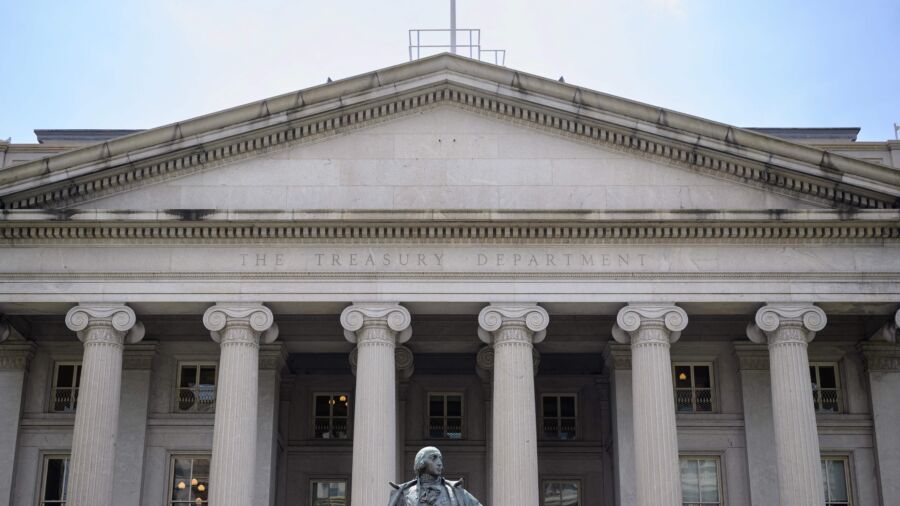The U.S. government’s budget deficit surged in May from the same time a year ago, as federal revenues declined and Medicare spending soared, new Treasury Department data revealed.
According to the Monthly Treasury Statement, the May shortfall surged to $240 billion, up from $66 billion a year earlier. The consensus estimate was a $236 billion deficit. In April, the Treasury reported a $176 billion surplus.
In the first eight months of the current fiscal year, the cumulative deficit totaled $1.165 trillion, up from $426 billion last year.
Treasury figures found that revenues declined 21 percent year-over-year to $307 billion, with higher tax return payments and non-withheld individual income taxes amid a softening economy slashing receipts. Outlays surged 20 percent from May 2022 to $548 billion, driven by a substantial increase in spending for the government-run Medicare health program for seniors.
Rising interest payments have also played a major role in the ballooning deficit. In May, net interest payments were $61 billion, bringing the fiscal year-to-date total to $424 billion.
The Congressional Budget Office (CBO), a nonpartisan federal watchdog, estimates that interest payments will be about $600 billion this fiscal year. CBO officials also forecast that the annual budget shortfall will exceed $2.6 trillion by 2033, even after the debt ceiling agreement is enacted.
Over the past 12 months, cumulative deficits have surpassed $2 trillion, or 8.1 percent of the gross domestic product (GDP), according to the Committee for a Responsible Federal Budget (CRFB).
As of June 12, the national debt is roughly $32 trillion, representing about $250,000 per taxpayer.
‘Serious Change’
Maya MacGuineas, president of the CRFB, warned that the nation’s fiscal outlook requires a “serious change; to argue otherwise is a charade bordering on a farce.”
“Today’s Treasury numbers serve as a stark reminder that our fiscal challenges are far from over. Much more will need to be done to ensure we don’t burden future generations with a smaller economy and a larger national debt,” MacGuineas said in a statement.
The Peter G. Peterson Foundation, a think tank dedicated to addressing economic and fiscal challenges, is concerned that interest, Social Security, and Medicare will continue to accelerate spending levels.
“Social Security and Medicare are key factors in spending growth,” the organization recently wrote in a report. “Driven by an aging population and rising healthcare costs, federal spending on such major healthcare programs (Medicare, Medicaid, premium tax credits and related spending, and the Children’s Health Insurance Program) will increase from 5.8 percent of GDP in 2023 to 6.9 percent in 2033, climbing even further in the following years to 8.4 percent by 2053. Spending for Social Security will also rise over that period, from 5.1 percent of GDP in 2023 to 6.0 percent in 2033, reaching 6.4 percent by 2053.”

Meanwhile, the public is beginning to become more concerned about the country’s finances.
A recent Pew Research Center study found that reducing the budget deficit is a higher priority for the American people than it was in 2022. Fifty-seven percent of survey participants say reining in the shortfall should be a top priority, up from 45 percent a year ago.
“Both Republicans and Democrats are more likely now than in 2022 to say this should be a top priority, but Republicans are still much more likely to prioritize this than Democrats are (71 percent vs. 44 percent),” Ted Van Green, a Pew research analyst, reported.
The U.S. is projected to record a $1.5 trillion budget deficit in the current fiscal year.
The current fiscal year starts in October and ends on Sept. 30, 2023.
Debt Ceiling Agreement
This was the first monthly summary of the federal government’s finances since President Joe Biden and House Speaker Kevin McCarthy (R-Calif.) reached an agreement to suspend the debt limit until January 2025 and avert a default.
The CRFB is ebullient over the Fiscal Responsibility Act (FRA), describing it as the first step in restoring fiscal disciple in the nation’s capital. However, with deficits still mushrooming, “substantial policy change will be needed to bring spending and revenue in line.”
“The roll-off (and possible reversal) of student debt cancellation and implementation of the Fiscal Responsibility Act are likely to help reduce deficits in the near term, but much more action will be needed to stem the unsustainable medium- and long-term trajectory of the debt,” it wrote.
Biden has repeatedly touted his record on the deficit and the FRA’s benefits.
“When I came into office, the deficit had increased each of the previous four years. And nearly $8 trillion was added to the national debt in the last administration,” he tweeted on June 4. “Our bipartisan budget agreement will build on our progress to change that course.”
Since Biden signed the FRA into law, the Treasury has been attempting to rebuild its depleted cash balance. The Treasury General Account (TGA) had declined to as low as $23.368 billion on June 5, but the Daily Treasury Statement highlighted that it had climbed to $77.5 billion on June 7. This is still well below the $316 billion sitting inside the Treasury’s bank account at the Federal Reserve at the beginning of May.
The Treasury plans to issue about $1 trillion in short-term government debt over the next six months to refill its coffers. There have been concerns that flooding the market with an immense amount of T-bills could result in liquidity issues amid the Federal Reserve’s tightening cycle and the financial sector’s credit crunch.
From The Epoch Times


